In FEBRUARY 2021 - by Dr. Peter Boskamp ...

Pigeon vaccines
In the past few months, various articles about the vaccination of pigeons have appeared in pigeon magazines. I also made some comments about it. However, what strikes me is that the opinions of the various pigeon doctors differ quite widely on various points. There are doctors who advocate live vaccines while others say dead vaccines should be used. There are reports that only your own vaccine is good and the rest would not work adequately. These are, of course, quite bold statements. Then there are doctors who suggest combinations of vaccines, whether in a syringe or not. Other doctors insist that we should never give two shots at the same time. In short, opinions seem to go in all directions. A pigeon fancier could be unsettled. My mailbox has been filled regularly over the past few weeks with how and why and with what to vaccinate or not. High time to clear things up and create clarity. I will try to name practical experience combined with transparency so that the pigeon fancier can decide for himself what is good for him.
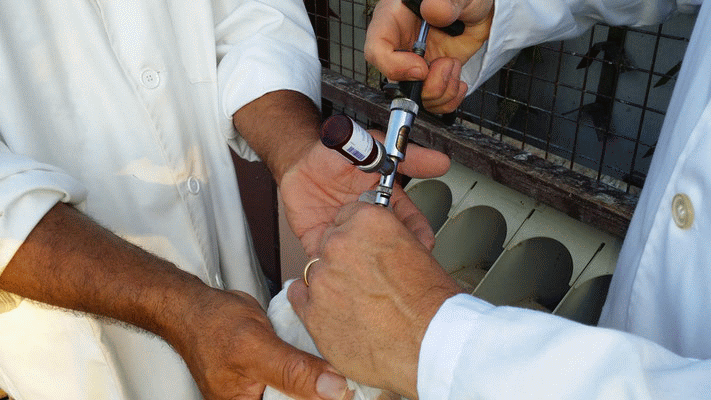
livelier versus dead vaccine
The new generation of injection liquids that now being tested on humans to fight the coronavirus I will do not consider further here, since the vaccines for pigeons are the normal ones are common vaccines and not experimental mRNA vaccines. we distinguish between live and dead vaccines. are live vaccines characterized by a pill that must be dissolved in water before the vaccine can be used. The vaccines are after a short time (usually a few hours) after the pill has dissolved. This should be taken into account when using these vaccines. Examples of these vaccines are smallpox vaccines and some Paratyphoid vaccines such as Zoosal T®. The last vaccine might not be soon be more available. The company IDT, which produced the vaccine, has sold the rights to it to third parties. Giving the live vaccines usually a stronger immune response than the dead vaccines. dead Vaccines usually contain something called adjuvants that stimulate the immune system stimulate. These vaccines usually don't work without the adjuvants good enough to generate sufficient immunity. Is it best using a live or dead vaccine depends on the circumstances and cannot always be answered with yes or no. Now if we look at the view different vaccines available for specific diseases, there are pigeon-specific vaccines, but also vaccines from others Species used in pigeons that have cross immunity expect is. This means that the vaccine from another animal species also dies dove protects. Examples include some vaccines against paramyxovirus, but also the vaccine against the circovirus used in pigs.
Circovirus
It turns out that many breeders are unaware of this virus. It has been present in Europe since 2000. It is a virus that lodges in the body's immune cells and can therefore reduce the pigeons' resistance to disease. All kinds of symptoms can appear, the question being whether they are caused by other infections that arise from infection with the circovirus or by the virus itself. After all, there are many asymptomatic carriers of this virus. The severity of the infection depends on the age at which the pigeons are infected. The younger they are, the more annoying the consequences can be. Until death. But even at a slightly later age, this can mean that pigeons, which are very sensitive to all kinds of infections, show little or no symptoms under normal circumstances. If this virus infects the pigeons before vaccination against rotavirus or paramyxo, for example, the response to these vaccinations is often poor. This virus is more common than many people think. Under normal circumstances without stress, this does not have to lead to clinical symptoms, if at all. This leads some pigeon doctors to conclude that this infection is not that important. However, I lean more towards the opinion of a sympathetic colleague who recently wrote an article about it in a magazine. This colleague claims that the vaccine of the pigs in the pigeons leads to the protection of the pigeons. I think further research is needed to gain more knowledge about it. However, I hear from several fanciers that they have had little or no problems with diseases in young pigeons since using this vaccine. The losses among the boys would also be lower. We vaccinated pigeons twice against this disease, but later found this virus in the faeces of these pigeons. This made us somewhat skeptical about its effectiveness. Nevertheless, the voices of the alleged effectiveness are getting louder. I will also vaccinate my own boys with it this year and then monitor the course of the detectability in the intestine. Old pigeons have little or no problem with this virus. The problems therefore mainly occur in pigeons with an immature immune system.
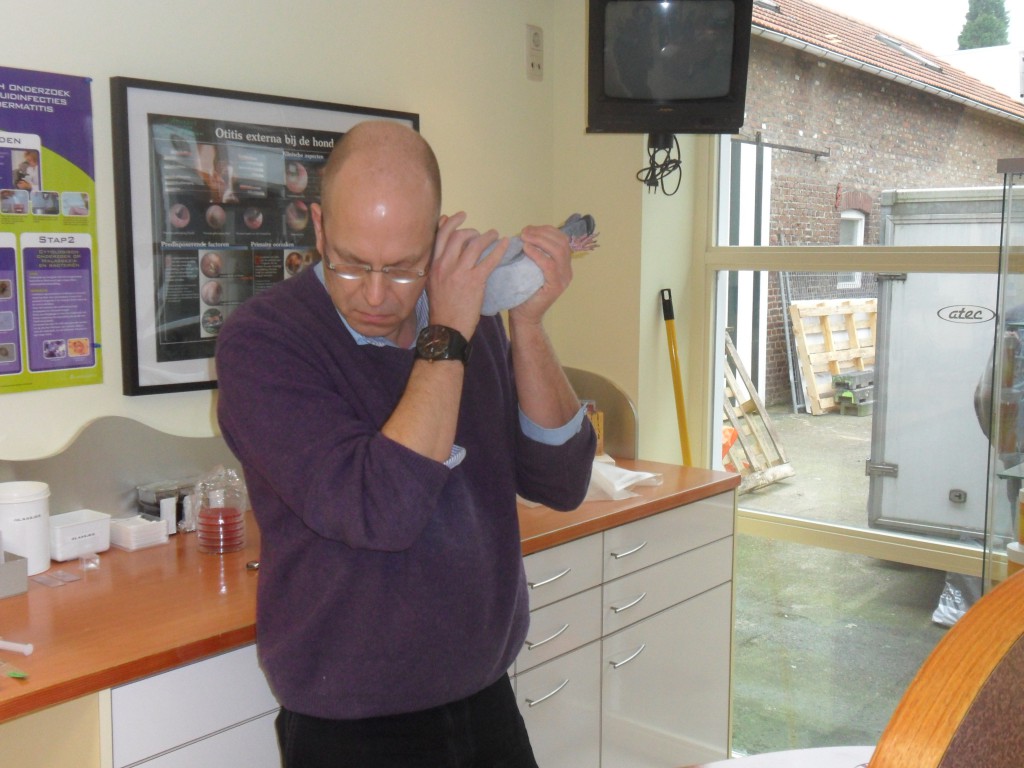
Rota- and paramyxovirus
A combination vaccine against Rota and Paramyxo infection has been used for more than two years. The practice has demonstrated that this vaccine does its job very well. Almost everyone who used this vaccine correctly (2 x vaccinations with three weeks in between), reports that the young animal disease no longer occurs. I already have in earlier newsletters mentioned that a German colleague has been for almost twenty Years has shown that this is the real cause of the “Coli” is. Included A combination of the adenovirus with an E. coli bacterium often played a role important role. Had an outbreak of cub disease two years ago we tested almost all samples that were offered in the clinic for viruses. Invariably, rotavirus or rotavirus with circovirus came out. Only in a few cases adenovirus was detected and E. coli was not seen. Therefore I agree to many of these German colleagues that the rotavirus is a very important one played a role in the spread of young animal disease. Because of the often simultaneous presence of the circovirus in many cases it is advisable repeat the rotaparamyxo vaccination after 3 weeks. Also a double shot against Paramyxo is not due to the frequent presence of the circovirus superfluous luxury more. The combination leads to almost no vaccination reactions and is therefore also a safe vaccine.
Paramyxo-Herpes- (Adeno)
A combination of paramyxo and herpes with or without Adeno is also available from the same company as Rota-Paramyxo vaccine. I also give this vaccine to my own (young) pigeons, in particular because of the herpes component. Although there are some colleagues, many of whom think knowing that this vaccination does not work, I have over the years received feedback from many breeders that the vaccinated youngsters suffer less from respiratory infections. However, one should not Make illusion that a single vaccination against this virus for life is effective. First, a double vaccination must be carried out for the first time and then vaccination on the loft is done annually. See this way we dormant herpes infections that have been tacit in the stocks for years may be present and therefore affect performance. Then take them slowly, so that the performance of the breeders shows an upward trend again. But it is mainly a long-lasting process. If you intend to do this vaccination only once, I recommend your Keeping money in your pocket because then it doesn't work as expected. at Problem hits, this can help reduce the problems.
Smallpox
In recent years we have seen smallpox in the pigeons every year. In the past, when the Ovoperisterin® vaccine was still available, there was a major outbreak of smallpox every five years. Most fanciers then re-vaccinated for a year or two so there was a general blanket of vaccination that protected the pigeons well. Vaccination was then often omitted again, whereupon after two to three years another severe outbreak occurred and everyone started vaccination again. In recent years we have regularly seen smallpox infections in the pigeons at the beginning of the year. I suspect this is a case of vaccinia in pigeons as the present vaccines produce a stronger vaccine response than the previous vaccine. As vaccinia emerges, many breeders will start vaccinating again. It is possible that this sustains vaccination responses and that smallpox has not gone away in recent years. The smallpox vaccine is a live vaccine. The pigeons can brush the vaccine on their chest or leg after pulling out some feathers, or the vaccine can be injected under the skin on the back of the neck. I see no difference in effectiveness.
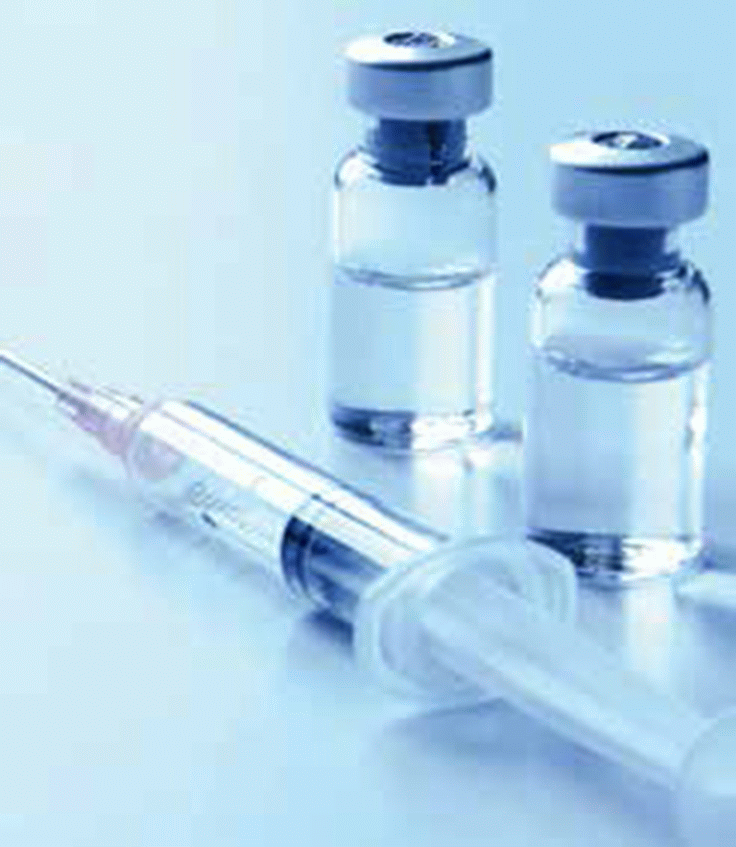
Paratyphoid
It remains a hot topic. Should the pigeons vaccinated become or not. If you play in a union, in which this disease occurs frequently, then I say yes. I say this even if you own one have onset of the disease. Then it can be part of the action plan, this fight disease on the fly. The illusion that this disease only can be fought with antibiotic treatment is a thing of the past on. An approach with remedies, vaccinations and, for example, a natural one Remedies like PreviSal can ensure that you slowly come out of the valley be able. Regular preventive treatments against paratyphoid can otherwise cause other problems. There are also living and dead here vaccines. The live vaccines are far from my preference. The dead vaccines cause many more vaccine reactions afterwards. seed nodules, suffering pigeons to pigeons slowly dying. I recommend this one current dead vaccine therefore not. Unfortunately, the days of the effective seem vaccine Zoosal T to be counted. Rumors are growing that he is market disappears. Then we must search for another effective living Find Paratyphoid Vaccine. So there are different vaccines available disease prevention. In practice, most vaccines are therefore satisfactory. I vaccinate my own pigeons with RP = Rotaparamyxo (2x) and PHA = Paramyxo Herpes and Adeno (2x). I am very satisfied with that. But as I often say … “There are many ways to get to Rome”.
Good luck!
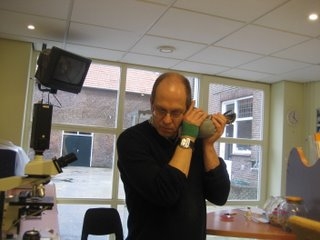
Advertising:
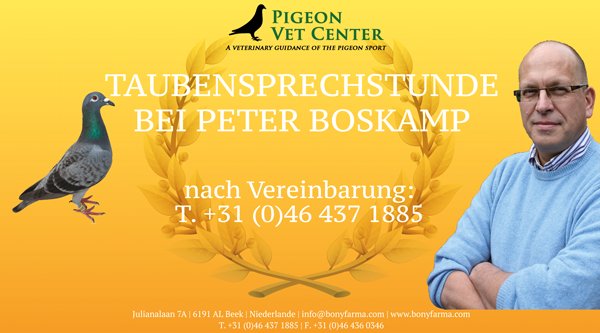
find them on a complete overview of Bony Farma Products www.bonyfarma.com.
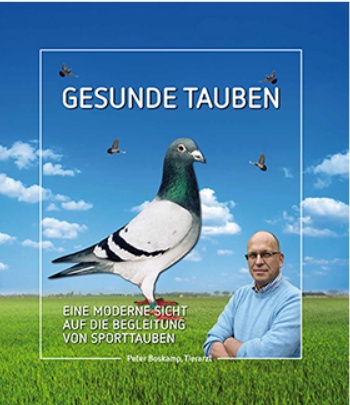
This practical book by veterinarian Peter Boskamp contains one Summary of his ideas and the approach that the Bony Farma product range.
The medical care in the pigeon sport is traditionally based on the aimed at healing sick pigeons. Drugs are often already used preventively. Due to the high risk of infection during the During the flying season, the use of medication is often essential. the Pigeon racing is a top sport. Even the smallest deviations can decide between victory or defeat. Today's legislation makes professional medical care in pigeon racing more difficult. In This book lays the foundations for strengthening general defenses discussed. At the same time, the possibilities are shown are available to sustainably increase the pigeons' defenses improve and the (increasing) dependence on medicines to decrease.
The book makes it clear that in addition to caring for sick animals especially the health care of the pigeons increased Attention should be paid. Because only with an optimal Health of the pigeons it is possible to the physical condition of the Animals to a higher level with the help of supportive preparations bring so that the desired services are actually provided can be.
Special Price € 29.95
You can order the book directly here ... (click)



